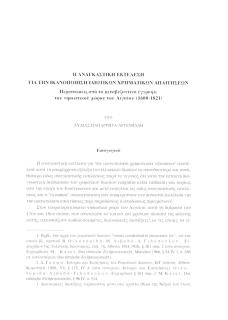Τεκμήρια από Κέντρον Ερεύνης της Ιστορίας του Ελληνικού Δικαίου
<< 10
10 >>
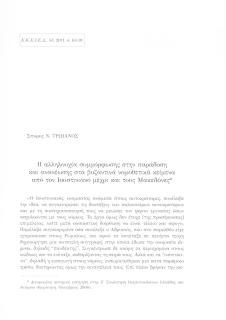
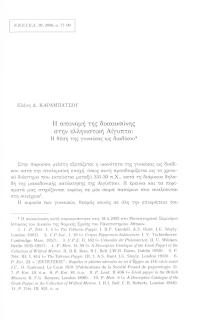
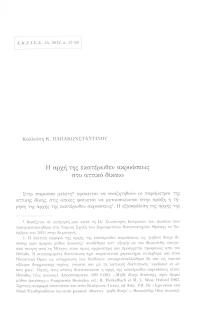
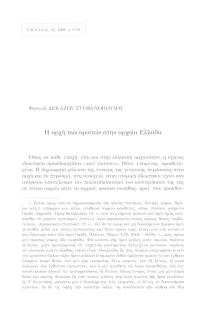
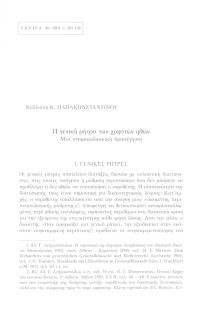
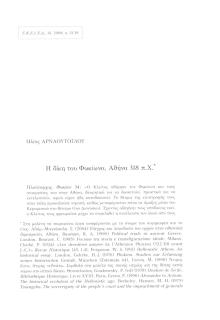
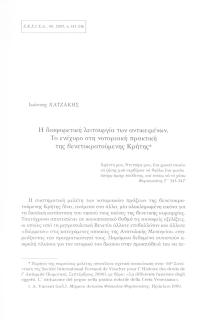
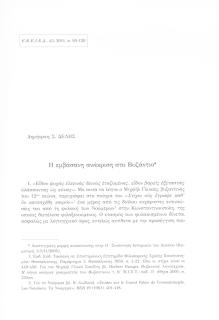
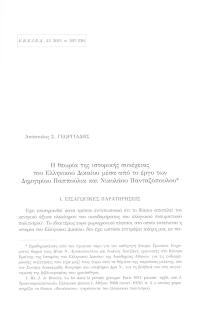
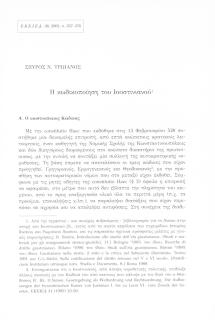
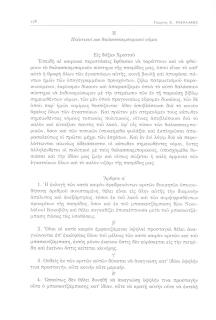 << 10
10 >>
<< 10
10 >>
Σύνολο: 11921

Η αλληλουχία συμμόρφωσης στην παράδοση και ανανέωσης στα βυζαντινά νομοθετικά κείμενα από τον Ιουστινιανό μέχρι και τους Μακεδόνες
Ενότητα: Μελέτες Ιστορίας Δικαίου
Sp. N. Troianos: Die byzantinischen Gesetzestexte von Justinian bis zu den Makedonen: Festhalten an der Tradition und Erneuerung Im vorliegenden Vortrag wird die variierende Auffassung von Tradition und Erneuerung in den Gesetzestexten des 6.-11. Jahrhunderts behandelt. Während nämlich Justinian und seine Juristen unter Tradition die römische Rechtsüberlieferung verstanden, bedeutete der Begriff Tradition für die Kaiser der makedonischen Dynastie das durch die justinianische Kodifikation überlieferte Rechtsgut. Hinsichtlich der Erneuerung, nebst der Schaffung neuer Rechtssätze, war sowohl im 6. als auch im 9./10. Jahrhundert von der "Reinigung der (alten) Gesetze” die Rede. Allerdings stellte man sich in justinianischer Zeit darunter die Befreiung der Gesetzesmasse von Widersprüchen sowie deren Systematisierung vor. während die makedonischen Kaiser durch die “Reinigung” auf die Beseitigung der von den Isauriern eingeführten Regelungen abzielten. Beim Rechtsetzen pflegten die Gesetzgeber oft den Inhalt der neuen Gesetze durch Berufung auf ...
Η απονομή της δικαιοσύνης στην ελληνιστική Αίγυπτο: Η θέση της γυναίκας ως διαδίκου
Ενότητα: Μελέτες Ιστορίας Δικαίου
39
Η αρχή της εκατέρωθεν ακροάσεως στο αττικό δίκαιο
Ενότητα: Μελέτες Ιστορίας Δικαίου
K.K. Papakonstantinou:Das Prinzip des rechtlichen Gehoers im attischen Recht Das Prinzip ‘μηδενί δίκην δικάσης πριν άμφοῖν μύθον άκούσης’ fuehrt zu dem Dichter Phokylides aus Mytilene zurueck. der im 6 Jhdt. v. Chr. lebte. Es ist aber, aller Wahrscheinlichkeit nach, aelter und stammt aus dem Dichter Hesiodos, der im 7. Jhdt v.Chr. lebte. Dabei handelt es sich in erster Linie um einen Ratschlag, die Gewährung rechtlichen Gehoers ist aber auch als Pflicht der verlosten Richter Athens im Heliasteneid beiinhaltet, wie es in der Rede von Demosthenes (24) gegen Timokrates ueberliefert worden ist. Das rechtliche Gehoer ist heutzutage immer noch gelaeufig als juristische Maxime mit universaler Bedeutung in der lateinischen Formulierung ‘audiatur et altera pars’. Die vorliegende Arbeit beantwortet die folgenden Fragen: In welchen Stadien des attischen Rechtsverfahrens war rechtliches Gehoer den Parteien zu gewaehren? Was geschah, wenn eine Partei nicht gehoert werden konnte? Wann wurde ein Versaeumnisurteil erlassen und auf welcher Weise konnte m...
Η αρχή των οριστών στην αρχαία Ελλάδα
Ενότητα: Μελέτες Ιστορίας Δικαίου
Ph. Dekazou-Stephanopoulou, L'autorité des «ὁριστῶν» en Grèce ancienne L’étude concerne l’institution des «ὁριστῶν» dans le cadre du droit ancien grec et recherche à constater quelques reflexions sur leur position sociale, leur rôle et leurs compétences. Il se réfère d’abord à la nécessité et à la façon de délimitation des regions, l'importance de cette délimitation, ainsi que l’établissement des peines au cas ou il existe une offence de l’inviolabilité des ces limitations. La nécessité de protection par des limitations artificielles explique l’existence des «ὁριστῶν», la fonction desquels est mentionne à certaines épigraphies et sources littéraires. Plus spécialement, sur l’épigraphie d'Irakleia, concernant la délimitation des «τεμένη» sacrés, cette oeuvre est décrite en détail et remarquable ponctualité. L’analyse du contenu des vers de l'épigraphie d’Irakleia, en combinaison avec les attestations d’autres sources, nous conduit au résultat que les «ὁρισταί», où on les rencontre dans la Grèce Ancienne, disposent une position sociale ha...
Η γενική ρήτρα των χρηστών ηθών. Μια ιστορικοδικαιική προσέγγιση
Ενότητα: Μελέτες Ιστορίας Δικαίου
C.Papaconstantinou, The general clause of ‘boni mores’ - a legal - historical approach The present study constitures a legal-historical approach of the concept of ‘boni mores’. It shows the necessity that led to the inregration of the concept of ‘boni mores’ as a general clause in the roman-byzantine, as well as in the current law: the lawgiver discharges himself from the necessity of a rigid case to case regulation. He avoids to integrate into law already formed moral conceptions and gives free space to the judicial judgment for the finding of the more lenient solution. ‘Boni mores’ constitute the conceptions of the members of the society for the commonly accepted social behaviour according to the tradition and the prevailing ideology in the social space. The larger consensus as to the criteria used for the judgment of a legal case forms part of the pervasive demands of every system of justice.
Η δίκη του Φωκίωνα, Αθήνα 318 π.Χ.
Ενότητα: Μελέτες Ιστορίας Δικαίου
Il. Arnaoutoglou, The trial of Phokion, Athens 318 BC In spring 318 BC Athens had experienced the last in a series of notorious political trials, that of Phokion, general for several years and leader of the pro-Macedonian faction in the city. Although there are many historical and historiographical accounts of the whole episode, light on the legal side of the case is rarely thrown. It is exactly this side of the story I explore, attempting to answer two questions: i) what was the charge against Phokion and ii) which procedure was followed. As for the charge, while most scholars agree that it was treason, I think there are good reasons to believe this was a case of combined charges, treason and abolition of the constitution. As for the procedure, the fact that Phokion was a magistrate at the time of the prosecution led to the submission of an eisangelia in the assembly, a procedure out of use since the middle of the 4th century BC
Η διαφορετική λειτουργία των αντικειμένων. Το ενέχυρο στη νοταριακή πρακτική της βενετοκρατούμενης Κρήτης
Ενότητα: Μελέτες Ιστορίας Δικαίου
I.Chatzakis, Il funzionamento differente degli oggetti. Il pegno nella practica notarile di Creta veneziana. La cessione dei pegni dalla parte del debitore per la garanzia del creditore, constituisce una pratica particolarmente diffusa durante il dominio veneto a Creta. E mentre nei primi secoli appare d’ essere collegata pricipalmente con il prestito, lo studio sulle fonti successive dimostra 1’ uso del pegno in varie atti giudiziari, con esempio più ca- ratteristico le vendite, dove si impegna una varietà dei oggetti per la garanzia del pagamento del prezzo accreditato. Tutti questi pegni, in- dipentemente dalla loro causa, con il rimborso del debito sono restituid nel loro proprietario. Al contrario ritardo del pagamento significa il loro alienamento in incanto, dopo la decisione della corte competente. Tutti questi elementi oltre all’ interesse legale che presentano, contribuiscono a la comprensione migliore dell’ organizzazione sociale ed economica dell’ isola di Creta nel periodo veneto.
Η εμβάσανη ανάκριση στο Βυζάντιο
Ενότητα: Μελέτες Ιστορίας Δικαίου
D.Délis: La torture judiciaire à Byzance La torture judiciaire, méthode d’ instruction largement pratiquée à Byzance à cause de l’absence de méthodes et techniques d’enquête scientifiques et réglementée minutieusement par le droit, était administrée pour arracher des aveux à un suspect criminel ou pour confirmer cet aveu ou pour obtenir un témoignage sur des affaires pénales ou du droit privé . À Rome critère important pour imposer la «quaestio per tormenta» était le statut d'esclave ou libre. La législation a autorisé la torture judiciaire en citoyens romains dès les empereurs Marc Aurèle et Lucius Verus (161-169 après JC), lorsque la grande formation des groupes des «honestiores» et des «humiliores» était introduite. La soumission des humiliores et des esclaves (non contre leurs maîtres) à la quaestio était la règle. À la période byzantine prejustinienne, quand la torture judiciaire avait une place dominante à la preuve des crimes sérieux mais aussi à l’enquête sur le domaine du droit privé, deux tendances sont observées : premièremen...
Η θεωρία της ιστορικής συνέχειας του Ελληνικού Δικαίου μέσα από το έργο των Δημητρίου Παππούλια και Νικολάου Πανταζόπουλου
Ενότητα: Μελέτες Ιστορίας Δικαίου
A.S. Geordiades: Die Theorie der geschichtlichen Kontinuität des griechischen Rechts im Werk von Dimitrios Pappoulias und Nikolaos Pantazopoulos Die Idee der historischen Kontinuität und Einheit des griechischen Rechts, die zum ersten Mal im späten 19. Jahrhundert durch die Lehre und die Arbeiten des Gründers der Neuen Historischen Rechtsschule Ludwig Mitteis begründet wurde, inspirierte eine Vielzahl theoretischer Forschungen auch in der griechischen Rechtswissenschaft. In der vorliegenden Studie wird die Lehre zwei führender Rechtshistoriker. Dimitrios Pappulias und Nikolaos Pantazopoulos. näher untersucht und ihre Begründung und Akzeptanz in der Wissenschaft bewertet. Das Ziel der Studie ist es. auf der einen Seite die ununterbrochene Kontinuität des griechischen Rechts als grundlegenden Teil der griechischen geistigen Kultur darzustellen und auf der anderen die wissenschaftliche Forschung zur weiteren Dokumentation der Theorie für die Einheit des griechischen Rechts zu motivieren.
Η κωδικοποίηση του Ιουστινιανού
Ενότητα: Μελέτες Ιστορίας Δικαίου
36

